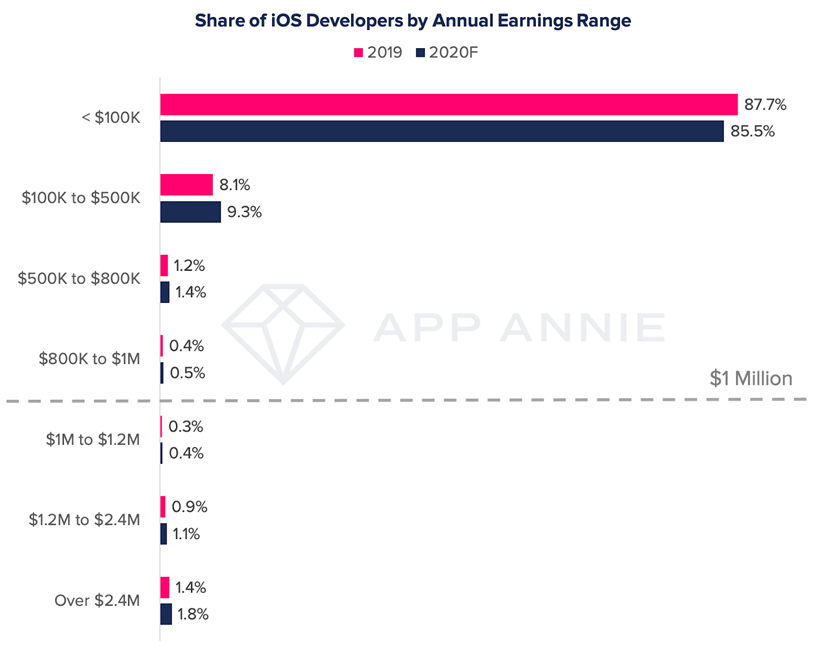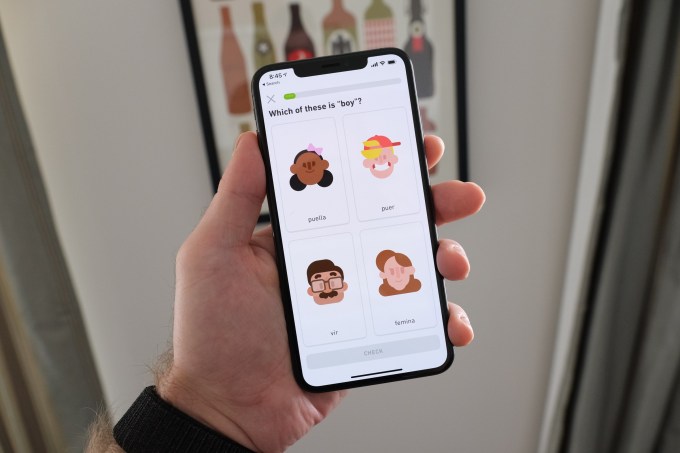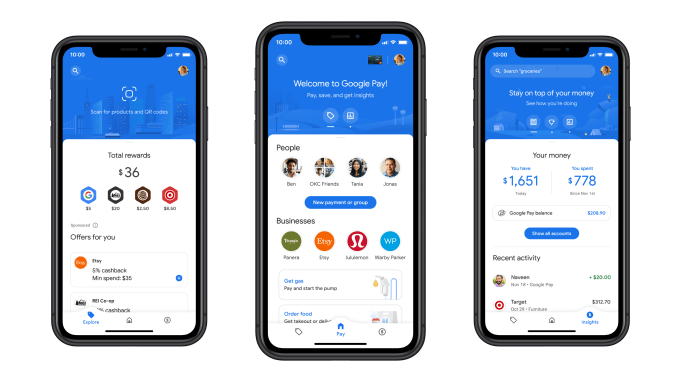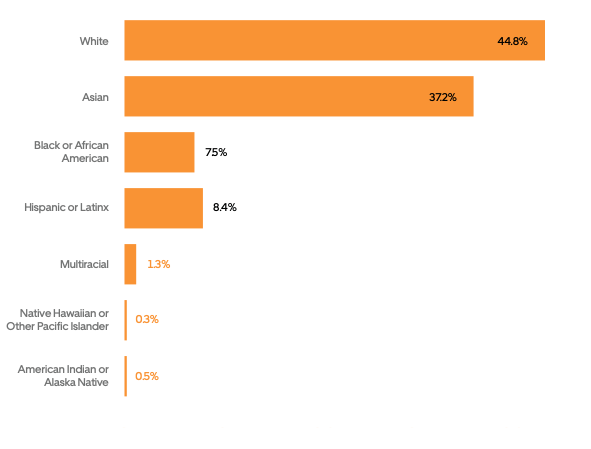Welcome back to This Week in Apps, the TechCrunch series that recaps the latest OS news, the applications they support and the money that flows through it all.
The app industry is as hot as ever, with a record 204 billion downloads and $120 billion in consumer spending in 2019. People are now spending three hours and 40 minutes per day using apps, rivaling TV. Apps aren’t just a way to pass idle hours — they’re a big business. In 2019, mobile-first companies had a combined $544 billion valuation, 6.5x higher than those without a mobile focus.
Top Stories
Apple reduces App Store commissions to 15% for ‘vast majority’ of developers
The changes apply to developers with less than $1 million in revenue.

Image Credits: TechCrunch
Apple this week announced a major shakeup to its App Store commission rate. The company, as of January 1, 2021, will only charge App Store developers 15% on paid apps and in-app purchases if their business has not exceeded $1 million in proceeds during 2020 for all their apps combined. Qualification for the new App Store Small Business Program, as it’s called, will be re-assessed revenues on an annual basis going forward.
The changes arrive at a time when Apple has been under increased regulatory scrutiny over how its App Store operates, which includes antitrust investigations in the U.S. and E.U. It has also waged war with developers throughout the year over in-app purchases, leading the company to revise its already complex rules even further, and spell out how and when it gets to charge its so-called “Apple tax.” And it’s in the middle of a nasty legal battle with Fortnite maker Epic Games, which doesn’t want to be forced to use Apple payments or even, necessarily, the App Store.
The commission changes may help silence some disgruntled voices from the wider app development community, while giving Apple a way to show regulators that it’s enabling fair competition.
However, several of Apple’s largest and harshest critics reacted negatively to the news.
The advocacy group, the Coalition for App Fairness, which includes Epic, Basecamp, Deezer, Match Group, Spotify and many others, said: “developers want a level playing field from Apple, not a symbolic gesture.” They argued that Apple still owns the customer relationship, the threshold of $1M is arbitrary, and they said the majority of developers who “generate livable revenue,” won’t benefit.
Match, Spotify and Epic separately echoed these sentiments in statements of their own.
Apple, though, had claimed the change would benefit the “vast majority” of the App Store development community. Today its App Store hosts 1.8 million apps that reach more than 1.5 billion Apple devices.
Individual developers we spoke to, including those who would qualify for the program, weren’t complaining. And many were fairly surprised by Apple’s move.
“I think it’s fair to say that this change wouldn’t have happened without either the impending antitrust investigations, or the Epic lawsuit. But something can be both a very clever piece of political manoeuvring, and still genuinely welcome and beneficial to the vast majority of developers out there,” said indie developer James Thomson, maker of the PCalc app and others.
“We fall significantly under the million dollar threshold, so we’re looking at roughly a 20% increase in our income under the new system. We’re in a much better position than most businesses under the pandemic, in that our sales are purely digital and people always need calculators (or dice), but we’ve certainly seen a decrease in sales over the last eight months. I can see the current situation taking a good while to resolve, so that extra revenue is appreciated,” he added. “These changes will particularly help the small developers who have traditionally been the heart of the developer community, and I as happy about this, as I am surprised,” Thomson said.
Others also said they were generally happy with the changes. But some expressed reservations about the details of how the program works.
“Overall, I’m very pleased with this new program,” said developer David Smith, maker of Widgetsmith, Watchsmith, Sleep++ and a range of other iOS apps. “It will help countless small developers who can really benefit from that extra margin. I’m excited for all the indie developers who will now be able to focus full time on their apps just that little bit sooner.”
But Smith noted that it was odd that the program isn’t applied in a way that’s similar to a graduated tax rate, where, he explained, “your first $1M is at 15% and the rest at the higher rate.”
“The proposed system creates an awkward differentiation between developers, and one of the things I’ve always appreciated most about the App Store was that it treats developers equally,” Smith continued. “It also creates a strange disincentive for growth for mid-sized businesses who are approaching the threshold.”
We turned to third-party analytics firms to try to better understand the market.
According to App Annie data, around 98% of all iOS developers in 2019 (meaning, unique publisher accounts) fell under the $1 million annual consumer spend threshold. This supports Apple’s claims that the “vast majority” of developers would benefit. This group of developers accounts for 567,000 unique apps, or 93% of all apps generating revenue through in-app purchases.
Combined, their revenues represented just under 8% of the overall App Store revenue share — in other words, it’s money Apple could stand to lose.

Image Credits: App Annie
App Annie also found that the group of mid-range developers who are “nearing” that $1 million threshold is really small. The data indicates roughly 0.5% of developers are making between $800,000 and $1 million. And just over 1% are in the $500,000-$800,000 range.
Most developers have much smaller revenue streams, with 87.7% making less than $100,000 in 2019.

Image Credits: App Annie
Some expressed concern that Apple’s system would unfairly penalize developers who made just $1 over the $1 million threshold, and then trap them at the higher rate (30%).
But others suspected that the percentage of developers who were growing “slowly” at over $800,000 in ARR was actually pretty small.
From the data we’ve collected, it seems that subscription-based apps tend to keep growing fairly quickly once they pass that $1 million threshold. According to data from subscription platform RevenueCat, the apps on its platform grow, on average, at 1.5x year-over-year. So once an app crossed the $1 million threshold, the most likely scenario is that it would make $1.5 million the next year. Plus, the apps that are “nearing” the threshold tend to be growing even faster than the average rate, we understand. And they rarely backslide.
“Apple has made a lot of changes to the App Store over the years, and this is one of the first I’ve seen where there’s really not much to complain about,” said RevenueCat CEO Jacob Eiting. “It’s impactful to the App Store economy broadly and meaningful to individual indie developers. Sure it may have been for PR and they might not have a lot of downside in doing this, but it’s genuinely a great thing for so many developers,” he said.
We’ll have more data on this subject in the weeks ahead.
Parler’s funders revealed…it’s the Mercers; parents warned about the app
The “Free speech” app Parler rising in the charts after Facebook and Twitter increased fact-checks, turns out to be funded by prominent conservative donor and Trump supporter Rebekah Mercer, The WSJ revealed.
Rebekah is the daughter of Robert Mercer, the hedge fund manager and principal investor in Cambridge Analytica — the data analytics firm behind the largest data leak in Facebook history, where 87 million users had their data harvested for the purposes of political advertising. The Mercers have also backed Breitbart News, the Heritage Foundation think tank, the Federalist Society, a super PAC that initially backed Ted Cruz’s bid for the Republican presidential nomination (before switching to Trump) and Citizens United (which distributed a 2007 anti-Clinton movie and succeeded in a Supreme Court ruling that reversed campaign finance restrictions), among other things.
This week, the nonprofit ParentsTogether issued a warning to parents about Parler, saying that the app’s weak moderation policies and extremist user base put kids at risk of exploitation, abuse and recruitment for racist violence. The organization described Parler as hosting dangerous content, including hate speech, incitements of violence and widespread disinformation.
In addition, the group was concerned that while Apple’s App Store rates the app at 17+, Google Play has it listed as suitable for kids ages 13+.
“All parents of children under age 18 to immediately check their kids’ phones and tablets to ensure that their children have not installed Parler,” the group warned parents, in a statement. “If your child has installed Parler, we strongly recommend that you delete their account and the app.”
Twitter launches Fleets

Image Credits: Bryce Durbin
Twitter this week launched its own version of Stories — aka “Fleets” — to its global user base. The product, which allows users to post ephemeral content that disappears in 24 hours, had already rolled out to select markets, including Brazil, India, Italy, South Korea and, most recently, Japan. The rollout almost immediately ran into some snags, with Fleets suffering performance and stability issues. Twitter said it would pause things while it worked this out. On Thursday, the company announced the feature was globally available.
Reactions to Fleets has been mixed. Some users hate the feature, which is designed to encourage more users to post to Twitter, when they’ve otherwise been too shy to participate — largely because of Twitter’s “cancel culture” vibe where mistakes, bad takes and unpopular opinions are harshly criticized, even when they’re more minor offenses. It’s not clear how a Stories feature resolves this, however, as Fleets are still being published to Twitter’s public social network.
Twitter also said it will begin testing a Clubhouse rival where users will join audio chat rooms.
These changes follow the activities by activist investor Elliott Management Group, which took a sizable stake in Twitter earlier this year, along with Silver Lake. The firms did so with a plan to push the company for more innovation and new executive leadership. The companies later struck a deal to spare Twitter CEO Jack Dorsey’s ousting, gain board seats, and put someone on the board with expertise in technology and artificial intelligence. Dorsey disagreed with the characterization that their involvement had any impact on product development.
Weekly News
Platforms
- Apple’s IDFA is targeted by EU privacy complaints. Apple had already told advertisers they’ll soon have to allow users the option to opt-out of ad tracking, but the new complaints are more about the fact that IDFA was ever created and stored in the first place, and that Apple’s planned changes don’t go far enough as they restrict its use for third parties, but not Apple itself.
- Apple’s Developer Transition Kits (DTKs) help developers get their apps ready for Apple’s silicon. But it turns out they won’t be able to install iOS or iPadOS apps like M1 Macs can.
- Google reminds Android developers they only have until January 18, 2021 to get approval to continue using background location data if they want to stay on Google Play.
- Apple releases a new version of iOS 14.2 for iPhone 12. The update appears to fix the iPhone 12 mini lock screen issue that caused some users’ lock screens to not respond to touches. The update also fixes issues with MMS messages, Made for iPhone hearing devices and more.
- Google also reminds Android developers that, starting Augut 2021, Google Play will require all apps to use the Android App Bundle publishing format and make other changes.
- Apple now allows developers to market and distribute their subscriptions with offer codes. These one-time, alphanumeric codes can be redeemed either on the App Store or within the app itself, allowing developers to acquire and retain customers or win back lapsed subscribers with special deals. Here are some tips on putting them to work.
- Apple’s iOS 14.3, beta 2 indicates that Apple will do away with the intermediate step of opening the Shortcuts app when app shortcuts are launched. This was one of the major pet peeves from the iOS 14 home screen customization trend, where users designed iOS themes using custom icons and widgets.
Services
Security & Privacy
- Dating app Bumble’s vulnerabilities puts Facebook Likes, locations and pictures of 95 million online daters at risk. Bumble took six months to fix the flaws and says no user data had been compromised.
- TikTok expands parental controls to include search, commenting and account privacy. The company launched Family Pairing in April, allowing parents to link their account to their teen’s in order to manage screen time, direct messaging and whether or not the teen’s account would be in “Restricted” mode — a special mode which limits TikTok’s feed to a safer set of more moderated content. This week, it also gave parents the ability to control whether the teen’s Liked Videos are visible to others, control who can comment on the teen’s videos and decide whether the teen is allowed to use TikTok search.
- Messaging app Go SMS Pro exposed millions of users’ private photos and files. The app, popular on Android, didn’t respond to security researchers about the problem. Typically, companies are given a 90-day deadline before vulnerabilities are made public.
Apps in the News
- Epic Games added video chat to Fortnite, via a Houseparty integration. The company bought the video chat app last year. Players use their phone or tablet as the webcam while they play on PCs, PS4 or PS5.
- Epic Games sues Apple in Australia too. The Fortnite maker is currently in a legal battle in the U.S. over Apple’s requirement to use Apple Pay and pay commissions on in-app purchases. In an interview this week, Epic Games founder Tim Sweeney likened the fight with Apple to a fight for civil rights. (That’s a bit much, we’d say.)
- Snap acquired Voisey, a U.K.-based app that lets users create music tracks and videos by overlaying their own vocals. The app had raise $1.88 million to date, but deal terms weren’t immediately available.
- Google Maps is updated with more COVID info and adds its Assistant driving mode. The COVID layer in Google Maps on Android and iOS can now show the number of all-time detected cases in an area, links to COVID resources from local governments and how busy transit lines are. The driving mode can read texts and lets you control your music from Maps.
- Facebook’s Messenger Kids redesigned to look more like Messenger. The updated app puts chats in a more traditional vertical list, with message and media previews, and bold text and blue dots to indicate their unread status. It also added a new tabbed navigation, which better highlights the separation between apps and games.
- YouTube launches 15-second audio ads aimed at users who listen to music or podcasts while the app plays in the background.
- Apple’s Shazam passes 200 million monthly active users.
- Instagram expands its Guides features and upgrades Search. Guides now allow creators to share tips, resources and other long-form content in a dedicated tab on their profiles. Now, everyone can make guides for Products, Places and Posts. Users can also now search by keywords, instead of just by names, usernames, hashtags and locations.
- Instagram also updates its Threads mobile messaging app. The app now adds a tab for easier navigation between stories and statuses. All users should also now have the tabbed inbox where they can see everyone’s stories, not just close friends, and have the option to publish to stories, not just close friends’ stories.
- Facebook sued an operator of Instagram clone websites. The operator had scraped Instagram data of some 100,000 accounts using its own 30,000 fake accounts that pretended to be humans to avoid detection.
- SoundCloud adds profile verification with official blue checks.
- App Growth Awards announce their finalists.
- Google launches iOS 14 widgets for Gmail, Drive and Fit. Says Calendar and Chrome widgets will come soon.
- State and federal investigators are preparing to bring antitrust charges against Facebook over its acquisition of Instagram and WhatsApp, The Washington Post reports.
- Twitter and Facebook sat for another congressional tech hearing that again largely served to give lawmakers a chance to just talk about whatever they wanted, instead of the topic at hand: social media’s role during the election. The CEOs were asked about their apps’ addictiveness, their algorithms, their approaches to misinformation and more.
Deadpool
Trends
- U.S. mobile strategy game spending surges 22% to $2.8 billion in the first 10 months of 2020, Sensor Tower reports. The top game by player spending during this time was Clash of Clans, which generated close to $262 million in the U.S.
- Top home screen widget apps have reached 1 in 7 U.S. iPhones, another Sensor Tower report claims. The five most popular apps — Widgetsmith, Color Widgets, Photo Widget: Simple, WidgetBox and Photo Widget — have collectively seen 13 million iPhone installs since the launch of iOS 14. Globally, they’ve reached 45 million installs to date.

Image Credits: Sensor Tower
Funding and M&A (and IPOs)

Image Credits: Duolingo
- Language learning app Duolingo confirms its raise of $35 million on a $2.4 billion valuation. The news was reported last week, but the numbers are now official. The app was valued at $1.65 billion earlier this year.
- Baidu to acquire Joyy’s Chinese live-streaming service YY for $3.6 billion. The search giant has been struggling to fight newcomers, like ByteDance, and video giant Kuaishou. Last year, Joyy’s YY took a $1.45 billion majority stake in Bigo, which operates streaming app Bigo Live and TikTok rival Likee.
- OpenPhone raises $14 million to replace outdated corporate phone systems with an app. Yammer founder David Sacks’ Craft Ventures led the round.
- Flipkart acquires AR startup Scapic to build an immersive shopping experience. Deal terms were undisclosed.
- Athlete social platform Strava raises $110 million in Series F financing from TCV and Sequoia Capital, with by Dragoneer Investment Group and existing investors including Madrone Capital Partners, Jackson Square Ventures and Go4it Capital.
- Yubo raises $47.5 million for its social app offering live-streaming rooms, now used by 40 million users. Existing investors Idinvest Partners, Iris Capital, Alven and Sweet Capital returned, and new investor Gaia Capital Partners joined.
- English learning app AllRight raises $5 million from Genesis Investments. The Ukraine startup combines real teachers with AI-powered tutors.
- ContextLogic, the maker of the mobile e-commerce app Wish, filed to go public. Wish saw revenues slow in 2019, but has grown more quickly in 2020. In the first nine months of 2019, Wish generated $1.33 billion in revenue compared with $1.75 billion during the same period in 2020, or up 32%.
- Roblox files for its IPO, noting it has lost $206 million on $589 million in revenue, has 31.1 million daily active users who now spend up to 22.2 billion hours in app, a figure up 122% year-over-year.
Downloads
Amazon’s GameOn
Amazon this week launched GameOn for Android, an app that lets users record 30-second to five-minute long gameplay clips — including through a “Recall” feature that saves the clip after it happens. Clips are then shared the GameOn social network or elsewhere on social media. The app supports more than 1,000 games at launch, including PUBG Mobile, Crossy Road, Final Fantasy Brave Exvius and Angry Birds 2. A selfie camera lets gamers add their own commentary to the clips. Winners of weekly challenges get special profile badges. The launch follows Amazon’s release of its cloud gaming platform Luna.
Google Pay

Image Credits: Google
Google Pay launched a major redesign of its app on Android and iOS this week with a ton of new features, including a mobile bank account. The company partnered with 11 banks, including Citi and Stanford Federal Credit Union, to launch Plex, a mobile banking service where accounts are held at partner banks but Google Pay operates as the front end. Plex users will have no monthly fees, overdraft charges or minimum balances and can pay both businesses and friends from their account. They can also explore offers and rewards to save money while shopping and get spending insights, including from their connected bank accounts outside the app. Another new feature makes it easier to split bills with friends, like restaurant checks, rent or utilities.
Moment’s RTRO app
RTRO, launched earlier this year, offers a way to record and share vintage-looking photos and video. This week, the app was updated with “Instant Film,” which lets you emulate instant film photos powered by the app’s “analog effects engine.” The resulting photos will give you the feel of a instant camera pic.


Source: Tech Crunch












